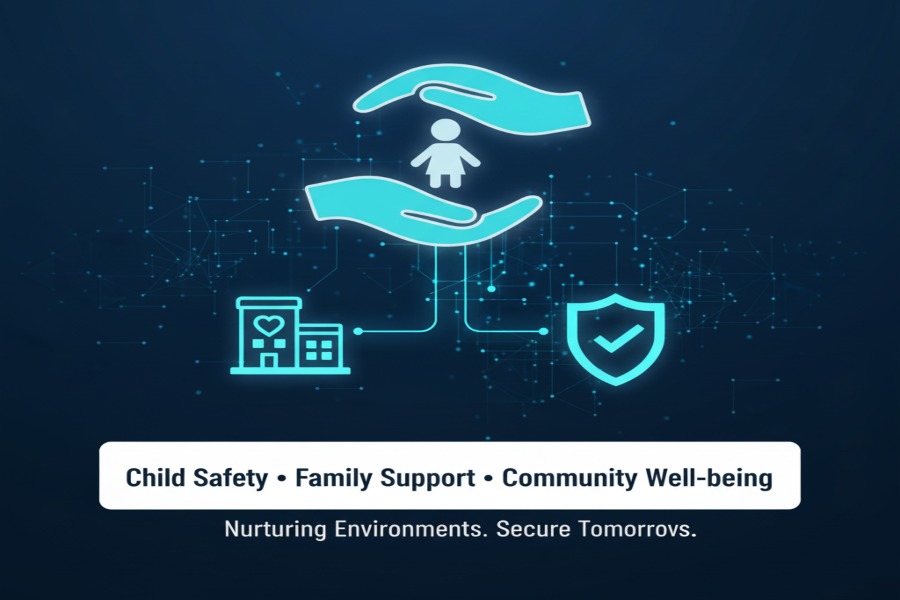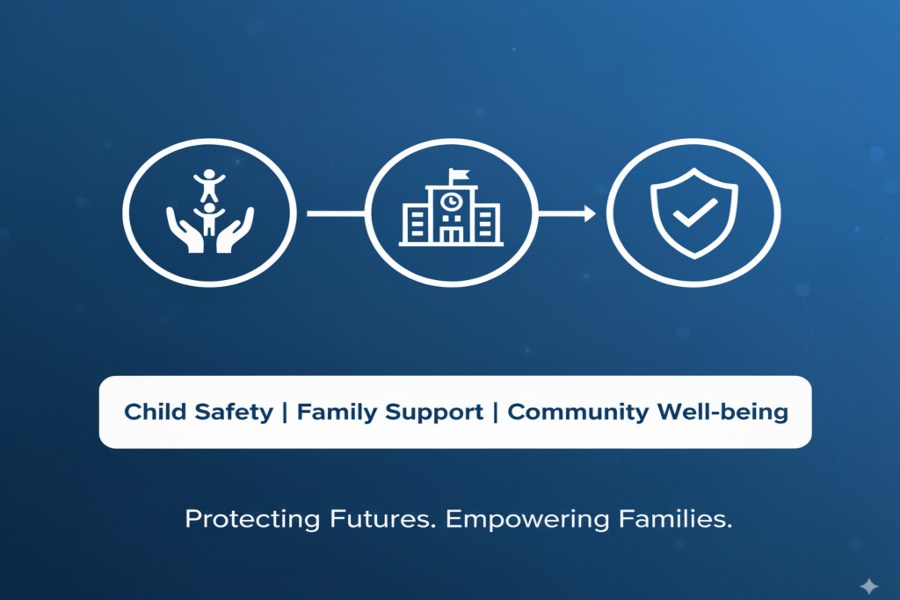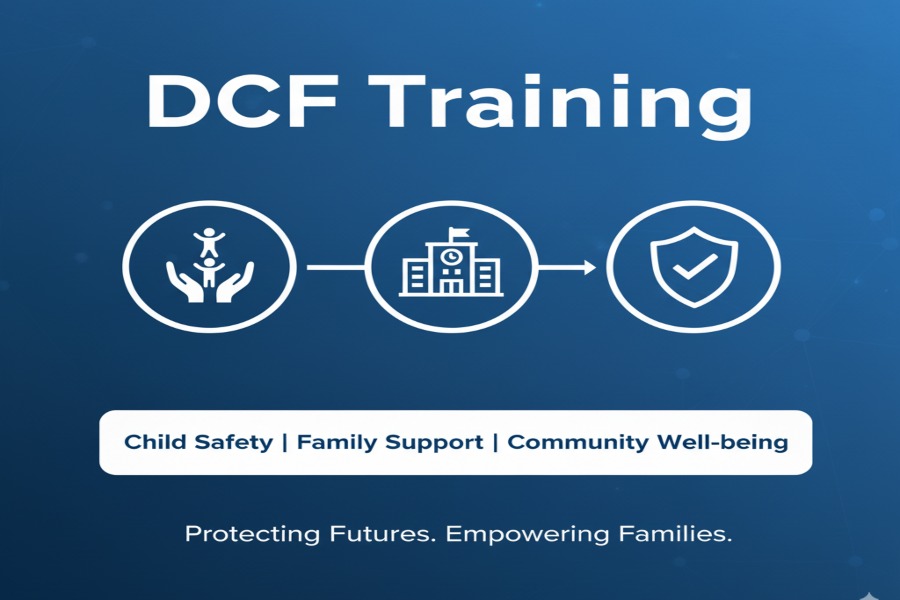In the fast-paced world of childcare, staying informed and compliant with state regulations is crucial for success. For childcare providers in Florida, completing DCF (Department of Children and Families) training is an essential step toward meeting the state’s childcare requirements.
This article delves into everything you need to know about DCF training, its benefits, and how it can be accessed through both traditional in-person methods and online platforms. Whether you’re just starting in the childcare field or looking to enhance your skills, this guide will provide all the necessary information to navigate and complete DCF training efficiently.
What is DCF Training?
DCF training is designed to ensure that childcare professionals are equipped with the knowledge and skills necessary to create a safe, nurturing, and educational environment for children. In Florida, the DCF mandates a series of training programs to ensure compliance with the state’s child care licensing requirements.
The training focuses on various aspects of childcare, including health and safety, child development, behavior management, and emergency preparedness. For childcare providers, completing these training courses ensures that they understand the state’s expectations for providing quality care and can meet regulatory standards.
Why DCF Training is Important
- Child Protection
DCF training equips childcare providers with essential knowledge on recognizing and addressing signs of child abuse, neglect, and other forms of harm. By understanding these indicators, providers can act quickly to protect children in their care. - Regulatory Compliance
Completing DCF training ensures that childcare facilities remain compliant with Florida’s child care regulations. These regulations are in place to protect both children and staff, ensuring that providers maintain high standards of care. - Professional Development
DCF training programs offer opportunities for childcare workers to build on their professional skills. Providers can learn new techniques in managing children’s behavior, improving learning outcomes, and creating engaging educational activities. - Health and Safety Standards
Safety is a top priority in any childcare setting. DCF training focuses heavily on health and safety protocols, including proper sanitation practices, emergency procedures, and understanding the importance of nutrition.
Types of DCF Training
Florida offers various DCF training courses, each focusing on different aspects of childcare. These include:

- Child Development Training
Child development courses help providers understand the stages of growth and learning that children go through. This knowledge allows providers to tailor activities that promote intellectual, emotional, and physical development. - Health and Safety Training
These courses focus on the safety of both children and staff, covering topics such as first aid, CPR, hygiene, and proper supervision. Health and safety training ensures that childcare providers are prepared for emergencies and can respond effectively to potential risks. - Behavior Management Training
Behavioral training courses offer techniques for managing children’s behavior in positive and constructive ways. Providers learn how to address discipline issues, promote healthy social interactions, and create a respectful environment for all children. - Early Childhood Education
This type of training focuses on strategies for educating young children. It covers curriculum design, early learning techniques, and creating a stimulating classroom environment. - DCF Family and Child Welfare Training
These specialized courses address family dynamics and child welfare concerns. Providers learn how to assist families in need and understand the complexities of child welfare law.
How to Access DCF Training
There are several options available for accessing DCF training:
- In-Person Training
Traditionally, childcare providers attended in-person training sessions, where they could interact with instructors and fellow participants. In-person training often included workshops, seminars, and certification programs. - Online DCF Training
With the rise of digital learning, online DCF training has become a popular choice. Platforms like ChildCareEd offer flexible, self-paced courses that can be completed from the comfort of your home. Online training is often the fastest and most cost-effective option, allowing childcare providers to complete their courses at their convenience.
Benefits of Online DCF Training:
- Flexibility to complete courses anytime, anywhere.
- Often more affordable than in-person classes.
- Instant access to course materials, quizzes, and feedback.
- Provides up-to-date content that can be applied directly to daily practices.
Popular Online Platforms:
- ChildCareEd: Offers a variety of online training courses tailored to meet DCF requirements. Providers can complete courses on health, safety, child development, and more.
- Florida’s DCF Online Portal: Florida residents can also access training resources directly through the state’s DCF portal, which offers an array of courses for childcare workers.
- Blended Learning Programs
Some providers opt for a hybrid model that combines both online and in-person elements. These programs often involve completing core courses online followed by hands-on workshops for more practical training.
How to Choose the Right DCF Training Program
When selecting a DCF training program, it’s essential to consider several factors to ensure it meets both your professional needs and state requirements:
- Course Accreditation
Make sure that the training provider is accredited by the Florida Department of Children and Families (DCF). Accredited programs ensure that the courses meet state standards and will count toward licensing requirements. - Relevance to Your Role
Choose courses that are relevant to your specific role and the age group you work with. For example, if you work with infants and toddlers, select child development courses that cover the early stages of growth. - Convenience and Flexibility
Online courses offer flexibility, but ensure the platform provides adequate support and easy access to materials. If you prefer in-person training, check local listings for available courses in your area. - Cost
Consider the cost of the training program and whether it fits within your budget. Online training programs often provide discounts and packages for multiple courses, making them more affordable.
The Future of DCF Training
As technology continues to evolve, so too does the world of DCF training. More and more courses are being offered online, allowing providers to complete their certifications from anywhere. Furthermore, online training platforms are integrating advanced features like interactive modules, virtual simulations, and community forums to enhance the learning experience.
In the future, we can expect even more tailored training programs that focus on specialized areas like child mental health, trauma-informed care, and inclusivity in the classroom.
The Role of DCF Training in Shaping Childcare Providers’ Careers
When childcare providers complete DCF training, they not only fulfill state requirements but also take a critical step toward advancing in their careers. Continuous learning and skill development are fundamental for anyone in the childcare profession, and DCF training lays the groundwork for achieving that growth.
For those who aspire to grow within their roles, the knowledge gained through DCF training can open doors to more advanced opportunities. For example, a childcare provider who has completed specialized training on child welfare and early education can seek positions such as program director, supervisor, or even start their own daycare business.
Furthermore, DCF training ensures that providers have a solid foundation in crucial areas like child safety, behavioral guidance, and emotional development. This solid knowledge base enhances providers’ ability to make informed decisions, positively influencing the children they care for.
The Importance of Understanding Regulatory Compliance
Compliance with DCF regulations is not just about avoiding penalties—it’s about providing a safer and more structured environment for children. Each childcare facility is required to adhere to certain safety standards that safeguard the well-being of children. These include guidelines for supervision ratios, proper staff qualifications, and maintaining a secure physical environment. By completing DCF training, providers understand exactly what needs to be done to remain in compliance with these standards.
In addition to ensuring a safe environment, compliance with DCF regulations helps build trust with families and parents. When parents are confident that childcare providers adhere to high standards, they are more likely to feel comfortable leaving their children in care. This trust is invaluable for building long-term relationships with families and ensuring business success.
As state regulations evolve, DCF training ensures that childcare providers remain up-to-date with the latest compliance measures. This ongoing education is crucial in an ever-changing landscape, as new laws and practices are introduced that affect how childcare facilities operate.
How DCF Training Helps Providers Handle Challenging Situations
Working with children can be rewarding, but it’s also full of challenges. From managing emotional outbursts to dealing with difficult behaviors, childcare providers often encounter situations that require calm, confidence, and expertise. DCF training courses provide the tools necessary to handle these situations effectively.
A core component of DCF training is behavior management. Providers are taught to identify the root causes of challenging behaviors, such as frustration, anxiety, or attention-seeking, and to address them in a constructive way. These strategies help to create an atmosphere of respect and positive discipline within childcare facilities.
Moreover, DCF training focuses on developing empathy and understanding toward children, especially those from diverse backgrounds. Cultural competence is emphasized, which encourages providers to be sensitive to the unique needs of children and families from various cultural and socio-economic contexts.
Emergency Preparedness and First Aid Training
Emergency preparedness is another key area covered by DCF training. In childcare settings, emergencies can range from medical situations, such as a child choking, to natural disasters like hurricanes. Providers must be ready to handle such events swiftly and efficiently to minimize risk and keep children safe.
First aid and CPR training are standard components of DCF courses. These certifications ensure that providers can confidently respond to medical emergencies. The ability to perform basic life-saving procedures can make all the difference in critical situations.
DCF also covers emergency evacuation plans, ensuring that all staff are well-versed in safe evacuation procedures in case of fire, flood, or other hazardous events. Being prepared for emergencies not only meets regulatory requirements but also helps create a secure environment that prioritizes the health and well-being of all children.
The Financial Impact of Completing DCF Training
While the upfront cost of DCF training may seem like an investment, it can yield substantial long-term benefits. Providers who have completed these courses are better equipped to handle complex situations and provide superior care, making them more competitive in the job market. Employers in the childcare industry are more likely to hire individuals who have completed accredited training programs, and they may offer higher salaries or additional responsibilities to those who are well-qualified.
Additionally, providers who offer specialized training, such as in child development or child safety, can command higher rates for their services if they run their own childcare business. Parents are often willing to pay a premium for providers who are well-trained and can offer a high standard of care.
Verisona Law can offer valuable legal guidance to childcare providers looking to navigate the regulatory and financial aspects of running a childcare business, ensuring compliance and protecting business interests. With legal counsel, providers can better understand how to structure their business, manage contracts, and avoid legal pitfalls, ultimately enhancing the profitability and sustainability of their services.
Investing in DCF training is an investment in both personal and professional growth. For individuals and businesses in the childcare industry, the returns—both financially and in terms of career satisfaction—are significant.
The Benefits of DCF Training for Parent-Provider Relationships
The relationship between childcare providers and parents is crucial. DCF training not only ensures that providers can care for children appropriately but also helps them communicate effectively with parents. Many DCF training courses emphasize family engagement, teaching providers how to have constructive conversations with parents about their child’s progress, behavior, and well-being.

Additionally, parents value providers who can offer a professional and thoughtful perspective on their child’s development. By being able to communicate about milestones, challenges, and behavior management strategies, providers foster a sense of partnership with parents. This collaborative approach ensures that both parties are working together in the best interest of the child.
Staying Updated on DCF Training Requirements
As mentioned earlier, DCF regulations and training requirements may change periodically, and staying up-to-date is essential for childcare providers. It’s important to continuously monitor updates from the Department of Children and Families to ensure compliance and avoid lapsing certifications. For instance, online platforms like ChildCareEd make it easy for providers to track their progress, renew certifications, and complete additional courses as required.
Providers who stay proactive in renewing their certifications demonstrate their commitment to high standards of care. Continuing education, whether through periodic refresher courses or specialized certifications, reinforces a provider’s dedication to staying current in the field.
Conclusion
DCF training is vital for childcare providers in Florida to ensure they are offering the highest standards of care and education. Whether you choose in-person or online training, these courses provide the necessary tools to succeed in the childcare industry. By staying up-to-date with the latest training requirements and certifications, childcare providers can build strong, safe, and nurturing environments for children.
Investing in DCF training not only helps you meet regulatory standards but also enhances your professional growth and ensures that you’re making a lasting positive impact on the children and families you serve.

